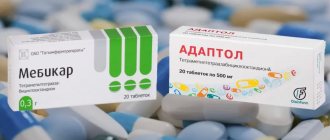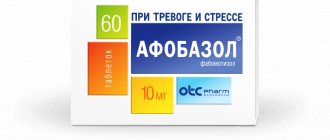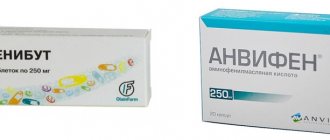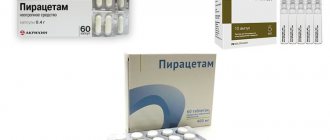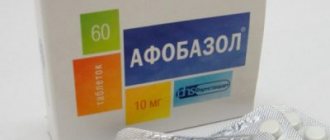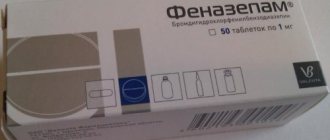Update date: 07/09/2020 17:06:24 12305 Share:
Author: Maria Feldshtein
*Review of the best according to the editors of simplerule.ru. About the selection criteria. This material is subjective in nature, does not constitute advertising and does not serve as a purchase guide. Before purchasing, consultation with a specialist is required.
Phenibut and Adaptol are used in clinical practice for the treatment of neuroses and neurosis-like conditions, including those caused by stress. To an uninitiated person, the drugs may seem the same - both are prescribed as a sedative. In fact, the difference between them is significant, because the drugs differ in composition and scope of application. We compared them: we looked at their strengths and weaknesses, analyzed the list of contraindications and adverse reactions, and are ready to tell you about it.
| The drug and its characteristics | Phenibut | Adaptol |
| Pharmacological group | Nootropic drug | Anxiolytic (tranquilizer) |
| Compound | γ-amino-β-phenylbutyric acid hydrochloride | Tetramethyltetraazabicyclooctanedione |
| Release form | Pills | Pills |
| Manufacturer | "Belmedpreparaty" (Belarus), "Ozon" (Russia) | Olainfarm (Latvia) |
| Price | 250-500 rub. | 700-900 rub. |
Indications for use
The drugs Phenibut and Adaptol belong to different pharmacological groups and have different areas of application.
Adaptol
Adaptol is prescribed primarily as a sedative for neuroses and neurosis-like conditions leading to irritability, emotional instability, anxiety and fear. It can also be used:
- As an adjuvant for cardialgia (heart pain) of various origins, except for ischemic heart disease (coronary heart disease).
- To reduce cravings for tobacco - makes it easier to quit smoking and increases the effectiveness of therapy.
- Against the background of the use of neuroleptics and tranquilizers. Adaptol reduces the risk of adverse reactions or facilitates their course - and improves drug tolerability.
Phenibut
Phenibut is also used as a sedative for neuroses, but its effect is not limited to this. The drug has a wide scope of application:
- asthenic conditions;
- neurosis with obsessions;
- obsessive movement syndrome;
- insomnia and nightmares;
- Meniere's disease;
- dizziness due to dysfunction of the vestibular apparatus;
- primary open-angle glaucoma - in complex therapy;
- treatment of alcoholism and alcoholic delirium - as one of the means.
Phenibut is also used as a premedication. It is prescribed before surgery and helps the patient calm down.
In pediatric practice, Phenibut is used to treat nervous tics, stuttering and enuresis.
As can be seen from the instructions, Phenibut is used for more serious clinical conditions and usually as one of the drugs in complex therapy. Adaptol is often used as a sedative for neuroses.
Characteristics of Phenibut
Phenibut is a drug that has anxiolytic and nootropic effects. It was developed in the USSR and was included in the list of equipment that cosmonauts took with them on flights. The benefits of Phenibut are due to its mechanism of action, which allows it to eliminate stress without affecting performance.
The active substance of the drug is aminophenylbutyric acid. It is a derivative of GABA, the main neurotransmitter in the brain responsible for the inhibitory effect. Once in the body, aminophenylbutyric acid inhibits the reactions of the nervous system, while mildly affecting some other receptors in the brain, which is why a slight activating effect is observed.
Phenibut is a drug that has anxiolytic and nootropic effects.
In addition to the effect on inhibitory neurotransmitters, Phenibut acts on cerebral circulation, increases the volume and speed of blood flow, thereby improving the nutrition of brain tissue. It has a slight vasodilator effect, which may reduce blood pressure.
The effects that Phenibut has: reducing stress, anxiety, restlessness, improving cognitive abilities, normalizing sleep. Improves motivation, stimulates action, reduces the manifestations of autonomic disorders - dizziness, nausea.
Prescribed for neurological disorders in children - nervous tics, speech problems. Can be used as a sedative before medical operations.
How do drugs work?
The pharmacological effect of a drug depends on which structures in the body it affects.
Adaptol
In its structure, Adaptol is similar to natural metabolites of the human body - after all, its molecule consists of urea fragments. The drug affects the limbic system in the brain and, in particular, the emotional center located in the hypothalamus. It also affects all four neurotransmitter systems and determines the production of choline, serotonin, dopamine and GABA.
Due to this Adaptol:
- Reduces or completely eliminates fear and anxiety.
- Relieves internal emotional tension, eliminates irritability.
- It enhances the effect of sleeping pills, but does not have a sedative effect.
- Relieves or removes cravings for tobacco and reduces symptoms of withdrawal symptoms.
- Improves concentration and memory, increases performance.
The calming effect of Adaptol is not accompanied by drowsiness, impaired coordination of movements, or muscle relaxation. The stimulating effect of the drug does not lead to euphoria. Therefore, Adaptol can be used during the day - it does not conflict with study or work. However, the drug may lower blood pressure, which may impair your ability to drive or perform tasks that require precision movements.
Phenibut
Phenibut acts directly on GABA receptors and facilitates the transmission of nerve impulses in the central nervous system. The drug normalizes metabolism in brain tissue, improves cerebral blood flow and acts as an antiplatelet agent - it prevents the formation of blood clots.
When taking Phenibut as a course:
- Reduces or completely eliminates feelings of anxiety, restlessness, and fear.
- Normalizes sleep.
- Relieves emotional stress.
- Eliminates vegetative-vascular symptoms - for example, headache, heaviness in the head and chest.
- It has a moderate anticonvulsant effect.
- Stimulates attention and memory, increases performance.
- In case of asthenia, it improves overall well-being and restores the taste for life.
Phenibut also:
- Stimulates blood flow in the tissues of the eye - and this effect is used for glaucoma.
- Reduces the toxicity of ethanol - and therefore is used in the complex treatment of alcohol addiction and its consequences.
- Improves the course of metabolic processes in the central nervous system - and is used to treat the consequences of traumatic brain injury.
- Can be prescribed to children and elderly people.
- While using the drug, it is not recommended to drive a car or perform work that requires increased concentration.
Characteristics of Adaptol
Adaptol is an anxiolytic, a drug with an anti-anxiety effect. The main component is mebicar, which was synthesized in the USSR.
Adaptol is a daytime tranquilizer that does not cause severe drowsiness. The drug relaxes the muscle structure, so it does not lead to problems with coordination. But it can reduce alertness and reaction speed, so you should refrain from driving while taking the drug.
Adaptol leads to an improvement in the balance of neurotransmitters, reducing feelings of anxiety and restlessness. It has a nootropic effect and increases mental activity.
It does not have a hypnotic effect, but enhances the effect of sleeping pills. Prescribed for neurosis-like conditions, anxiety disorders, hypomania, residual effects after psychosis, as part of complex therapy - in the treatment of withdrawal symptoms of various origins.
Evidence base: which drug has not been tested
From the standpoint of evidence-based medicine, both drugs are not of particular interest. They have not undergone clinical trials to prove their effectiveness - and there is no reliable information that these products actually work.
Adaptol
In Russian-language literature they like to praise Adaptol. In scientific articles over the past ten years, the drug copes well with autonomic dysfunction: it eliminates feelings of fear and anxiety, but does not cause drowsiness - and therefore can be used during the daytime. In another review, Adaptol is successfully used in psychiatry and neurology for the treatment of various disorders - both on an outpatient basis and in a hospital setting. also that the drug is effective for irritable bowel syndrome - as one of the means in complex therapy.
Foreign sources treat Adaptol with caution. Cochrane Library Search: The drug has not been studied and it is premature to talk about its effectiveness. One of them, posted on the PubMed portal, proved the positive effect of Adaptol in patients with muscular dystonia. However, there are no reports that the trial met international criteria (that is, it was double-blind, placebo-controlled). The fact that only 40 people took part in the study is also not credible.
Thus, while we cannot say that Adaptol effectively copes with its task - there is no evidence of its positive effect on the body.
Phenibut
There are more than 200 articles on the drug in the PubMed database, but most of them talk about the action of the active substance in vitro - under laboratory conditions. Not many trials have been conducted on humans - only 12 articles are devoted to this issue. However, these studies do not meet international criteria for evidence-based medicine. For example, in 2021, scientists tested the effectiveness of the drug against tension headaches. The study was open and only 30 people took part in it. Based on these data, one cannot draw conclusions and say that the drug really works.
Description of Adaptol
The anti-anxiety drug Adaptol is produced by Olainfarm in Latvia. Produced in tablet form. The main active ingredient is mebikar.
Positive effects of taking the medicine:
- reduction of tension and irritability;
- withdrawal relief;
- normalization of sleep;
- improvement of cognitive function.
It has tranquilizing activity without a hypnotic effect. Has a positive effect on the hypothalamus. Has a calming and nootropic effect. According to research, the drug increases the speed of thinking, logic and performance.
Research and effectiveness
In one study, Adaptol was used to eliminate burnout syndrome. According to the results, this drug is effective for the treatment of SES. In this case, the dopamine-positive effect of the drug plays a role. It is also important that the use of Adaptol does not have a significant impact on social life. The results of the positive effect of the drug are confirmed by neurophysiological studies.
Adaptol has also shown itself well in the treatment of neurasthenia associated with irritable bowel syndrome. An improvement in the condition is observed already from the second week of treatment. The drug acts as a gentle antidepressant for somatoform and neurotic disorders.
Sources:
- The role of Adaptol in the correction of neurasthenia in patients with IBS. Alekseev E.E. 2012.
- Clinical and neurophysiological study of the effectiveness of the drug Adaptol in the treatment of SES. Chutko L.S. 2010.
Contraindications
Adaptol is not used if you are intolerant to the composition or allergic to the components. It is prescribed with caution in case of low blood pressure and against the background of severe diseases of the kidneys and hepatobiliary system. No experience with children.
The drug can cause a decrease in blood pressure, so it is not recommended to drive complex mechanisms and vehicles during treatment.
Adaptol penetrates into all liquids, but its effect on the fetus and the course of pregnancy has not been sufficiently studied. Women should not use the medicine during this period.
Side effects
Possible undesirable symptoms from the use of Adaptol include:
- SSS – decrease in blood pressure;
- Gastrointestinal tract – dyspeptic manifestations;
- respiratory organs – bronchospasm;
- allergies – skin redness, itching, rash;
- decrease in temperature, weakness.
In case of general manifestations such as malaise and hypothermia, it is not necessary to discontinue the drug. The temperature gradually returns to normal on its own.
Dosage
The drug is taken orally. A single dosage for adults is 300-500 mg. The medicine is taken up to 3 times a day. The maximum dosage per day is 10,000 mg. The course usually lasts 2-3 months. The duration of treatment is determined by the doctor individually.
For children over 10 years of age, the drug is prescribed 300-500 mg per day, 250 mg 1-3 times.
Adaptol should not be combined with sleeping pills, antipsychotics, tranquilizers, antidepressants, or psychostimulants.
Who is it suitable for?
Adaptol has an anti-anxiety effect. It reduces feelings of anxiety and fear, reduces irritability, and gives a calming effect.
The properties of the drug allow it to be used for the following disorders and conditions:
- neurosis-like states with feelings of anxiety and fear;
- nicotine addiction to reduce cravings;
- for heart pain of various origins;
- to improve the condition of PMS and menopause.
Adverse reactions
Let's take a closer look at each drug.
Adaptol
Practice shows that Adaptol is well tolerated. Sometimes the drug causes an allergic reaction. Rarely, a decrease in blood pressure and body temperature and dizziness are observed. In high doses it can cause bronchospasm.
When pressure and temperature decrease, no dose adjustment is required. Such symptoms go away on their own after adaptation to the drug.
Addiction, mental and physical dependence to the drug do not develop.
Phenibut
When using the drug, the following undesirable symptoms occur:
- CNS: agitation, irritability, headache, drowsiness.
- Gastrointestinal tract: nausea (passes after adaptation to the drug).
- Allergic reactions: skin itching, rash.
Comparison of Adaptol and Phenibut
The drugs have many similarities, because they belong to the same group of drugs. There are differences in contraindications and mechanism of action. Phenibut differs in that it is prescribed for a number of neurological problems in children. Sometimes doctors may prescribe Adaptol and Phenibut together.
Similarities
Medicines have anti-anxiety and nootropic effects. They have general indications - anxiety disorders, stress, sleep disorders, asthenia, neurosis. They do not cause drowsiness during the daytime and increase performance. Have few side effects. Both drugs are prescription drugs.
What is the difference?
Phenibut can be prescribed to children, Adaptol is allowed to be taken only by adult patients. Phenibut has a wider spectrum of action - in addition to eliminating stress and anxiety, it helps with a number of neurological diseases. Phenibut should not be used by people with gastrointestinal pathologies and impaired renal function.
What's stronger?
Despite similar effects, the drugs have differences in the mechanism of their effect on the body. Depending on what caused the patient’s problem, Adaptol or Phenibut will have different effective effects. If disturbances appear due to oxygen starvation of the brain or problems with the conduction of nerve impulses, Phenibut will be more effective; if there is a deficiency of the neurotransmitter serotonin, it is better to take Adaptol.
If you have a deficiency of the neurotransmitter serotonin, it is better to take Adaptol.
Which is cheaper?
Phenibut will cost less than Adaptol. A package of Phenibut containing 20 tablets can be bought for less than 200 rubles, a similar amount of Adaptol costs about 700 rubles.
"Phenibut": description of the drug
Phenibut is a nootropic and psychostimulant drug.
Normalizes metabolic metabolism in brain tissue . Affects blood circulation in the brain, thereby improving its functional state.
It has antiplatelet properties and reduces the tone of cerebral vessels.
Stimulates mental activity and memory functions. Increases the brain's resistance to negative factors.
Available in tablet form. The main active ingredient in the tablets is aminophenylbutyric acid hydrochloride.
Excipients: sodium glycolate, MCC, colloidal silicon dioxide, etc.
Indications and contraindications
Phenibut is prescribed for the following conditions:
- Meniere's disease.
- Neuroses.
- Emotional lability.
- Unfounded fears.
- Deterioration of intellectual abilities.
- Memory disorders.
- Asthenic syndrome.
- Insomnia.
- Increased anxiety.
- Alcoholism (to relieve withdrawal symptoms).
- Pathological conditions during menopause.
In pediatrics, the medicine is used to treat nervous tics, enuresis, and logoneurosis.
Contraindications for use are: lactation period, pregnancy (first trimester), intolerance to any of the components of the drug, children under 8 years of age, liver or kidney failure.
Caution is required when prescribing medication to patients with gastrointestinal pathologies (ulcers, erosions).
Side effects include attacks of nausea, pressure changes, drowsiness, and headaches.
Basically, such manifestations are observed only at the beginning of the course of therapy.
pharmachologic effect
A course of Phenibut helps:
- Increasing the body's resistance to stress factors.
- Improving memory functions and learning ability.
- Increasing clarity of consciousness.
- Improving critical capabilities.
- Reducing the severity of the consequences of TBI, strokes, and brain intoxications.
- Stabilization of energy processes occurring in the brain.
- Activates blood supply and utilization of glucose by the brain.
- Eliminate symptoms of asthenia.
- Reduced irritability.
- Increases motor, speech, volitional activity, etc.
Considering that the therapeutic effect of the drug manifests itself gradually, usually after several weeks, it is recommended for a course of use.


